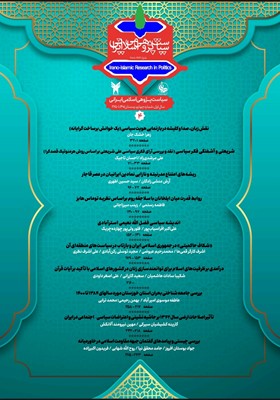بررسی چیستی و پیامدهای گفتمان جبهه مقاومت اسلامی در خاورمیانه
محورهای موضوعی : تحولات سیاسی در ایرانجواد بوستان افروز 1 , حامد محقق نیا 2 * , روح الله شهابی 3 , فریدون اکبرزاده 4
1 - دانشجوی دکتری گروه علوم سیاسی، واحد اهواز، دانشگاه آزاد اسلامی، اهواز، ایران
2 - استادیار، گروه علوم سیاسی، واحد اهواز، دانشگاه ازاد اسلامی، اهواز، ایران
3 - استادیار گروه علوم سیاسی، واحد اهواز، دانشگاه ازاد اسلامی، اهواز، ایران
4 - استادیار گروه علوم سیاسی، واحد اهواز، دانشگاه آزاد اسلامی، اهواز، ایران
کلید واژه: جبهه ی مقاومت, خاورمیانه, گفتمان, انقلاب اسلامی,
چکیده مقاله :
از جنبش هایی که امروزه در تلاش است که در تحولات منطقه خاورمیانه تاثیرات موثری داشته باشد جبهه ی مقاومت اسلامی است. این جنبش در چند دهه ی اخیر در متن تحولات منطقه خاورمیانه و نظام بین الملل اثرگذار بوده و توانسته با الهام گیری از گفتمان انقلاب اسلامی بطور گسترده مطرح گردد. بر این اساس گفتمان جبهه ی مقاومت با قدرتی فزاینده توانسته تقابل جدی تری با نظام سلطه ایجاد نماید. بطوری که می توان گفت مقابله با نظام سلطه در کشورهایی مانند عراق، سوریه، لبنان، فلسطین و یمن منجر به تغییر چالش ها و شکست هژمونی استکبار در منطقه گردیده است. با توجه به روند تحولات جهانی و منطقه ای، در این مقاله سعی شده است در پاسخ به پرسش چگونگی تبیین گفتمان مقاومت و پیامدهای آن در خاورمیانه از نظریه لاکلا و موفق با روش تحلیلی - توصیفی و شیوه تحلیل گفتمان استفاده نماید. یافته های این پژوهش حاکی از آن است که می توان نشانه هایی را که در گفتمان مقاومت طبقه بندی شده اند را به دو دسته طبقه بندی نمود . بخش اول عوامل سلبی (نفی) و بخش دوم عوامل ایجابی (اثباتی) هستند. در مرکز بعد سلبی گفتمان مقاومت سلطه ستیزی قراردارد یعنی مهمترین نشانه ی سلبی نفی سلطه وسلطه ستیزی است . اما مهمترین وجوه اثباتی گفتمان مقاومت، مفاهیم عدالت خواهی، حق طلبی، صلح طلبی، عزت طلبی، اقتدار، معنویت گرایی و مصلحت گرایی می باشد .
Among the movements that are trying nowadays to have an impressive effect in the Middle East developments, can refer to the Islamic Resistance Front . This movement has been effective in the context of Middle East and international system's political, social developments in the last few decades, meanwhile was able to be widely discussed with the inspiration and modeling of the Islamic Revolution discourse. Accordingly, the discourse of the Islamic Resistance Front has been able to develop a more serious confrontation in a growing power with the domination system through the support of Islamic Revolution of Iran, so that it can be said that this confrontation with the domination system in countries such as Iraq, Syria, Lebanon, Palestine and Yemen has been led to a change in the challenges and the defeat of arrogant hegemony in the region. Considering the trend of global and regional developments after Islamic Revolution's victory and the spread of resistance act against the forces of anti-domineering, as well as the lack of available researches in this article has been tried to use Laclau and mouffe theory in an analytical-descriptive method and discourse analysis technique to response the question of how to explain the discourse of resistance and its consequences in the Middle East. The findings of this research indicate that the signs classified in the discourse of resistance can be classified into two categories. The first part is negative (negation) factors and the second one is affirmative (positivity) factors. The anti-dominance exists in the center of resistance discourse's negativity dimension, namely, negating domination and anti-dominance are the most important sign of negativity. But the most important affirmative forms of the resistance discourse, which are at the center of it, are some concepts like seeking justice, seeking rights, pacifism, dignity, authority, spiritualism and pragmatism.
_||_

